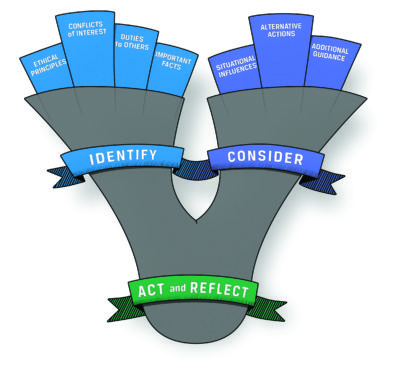Ethics in Practice: Comment on Facebook Your Responsibility? Case for Week of 14 May and Analysis
The analysis in now included below. How did you do in assessing this somewhat tricky situation?
Using social media platforms, such as Facebook, to advertise services or provide helpful information to clients is common practice these days. But what responsibilities do you have regarding what others may say when commenting on your posts? Read this week’s case about just such a situation, and then join the conversation to let us know whether any CFA Institute Standard of Professional Conduct has been violated.
Case
Wieters runs an investment advisory firm that specializes in equity only asset management. For clients and prospective clients seeking to follow a balanced or fixed-income strategy, Wieters posts on her firm’s Facebook page the names of a number of firms that she is familiar with that provide these services. One of the firms replies in the comment section of the post, providing basic performance history information and claiming compliance with the GIPS® standards. Unknown to Wieters, the performance history is misleading and the claim of compliance with the GIPS standards is inaccurate. Has Wieters violated the CFA Institute Code and Standards?
- Yes because Wieters must exercise diligence and have a reasonable and adequate basis for every statement made on her firm’s Facebook page.
- No as long as Wieters does not receive referral fees from the adviser for including the adviser’s information in the original post.
- Yes if Wieters “likes” the post by the adviser containing the erroneous information.
- No because Wieters is not responsible for any information posted by third parties in the comment sections of her firm’s Facebook page.
Analysis
This case involves CFA Institute Standard I(C): Misrepresentation, which states that CFA Institute members and candidates must not knowingly make any misrepresentation relating to investment analysis, recommendations, or actions. Wieters has the responsibility under Standard I(C) to make sure that any professional communications she puts out are not misleading, whether or not the statements are verbal, written, or posted on social media. In this case, although the misleading statements are posted on the social media platform that Wieters controls, the misleading statement is clearly made by someone else because it is in a comment written by another person.
Therefore, Wieters may not be considered responsible under the CFA Institute Code and Standards for verifying the truthfulness of others information. In providing a list of potential service providers for a style of investment she does not provide, it is not clear whether she is recommending the services of those firms in her post. A recommendation of services would be a step that moves Wieters closer to endorsing the misleading information rather than passively allowing comments by others on her social media account. The payment of referral fees (or no payment of referral fees) is not relevant to the misrepresentation issue. Wieters would be in danger of violating the Code and Standards if she knows the adviser’s information to be false and allows it to remain on her Facebook page. It is, therefore, not the case that Wieters is never responsible of any information posted by another person on her page. (In this scenario, the facts are clear that she does not know that the performance history and claim of compliance with the GIPS standards are false.)
Answer C is actually the best answer because if Wieters “likes” the adviser’s comment or responds in another way that indicates she explicitly or implicitly endorses, adopts, or approves the content of the comment, that would effectively be a communication made by Wieters. She would then become responsible for the content. By “liking” the adviser’s misleading performance information, Wieters becomes the author of a separate and distinct communication that includes misleading statements. To be safe, best practice would be for Wieters to remove from her Facebook page any potentially problematic or unverified statements or comments made by others until she can determine the veracity of those statements.
Have an idea for a case for us to feature? Send it to us at [email protected].
More About the Ethics in Practice Series
Just as you need to practice to become proficient at playing a musical instrument, public speaking, or playing a sport, practicing assessing and analyzing situations and making ethical decisions develops your ethical decision-making skills. The Ethics in Practice series gives you an opportunity to “exercise” your ethical decision-making skills. Each week, we post a short vignette, drawn from real-world circumstances, regulatory cases, and CFA Institute Professional Conduct investigations, along with possible responses/actions. We then encourage you to assess the case using the CFA Institute Ethical Decision-Making Framework and through the lens of the CFA Institute Code of Ethics and Standards of Professional Conduct. Then join the conversation and let us know which of the choices you believe is the right one and explain why. Later in the week, we will post an analysis of the case and you can see how your response compares.
Image Credit: ©CFA Institute


Option C. should be the right answer. As it is mentioned in the question that the misleading history and misrepresentation is unknown to Wieters. So if Wieters likes the comment before doing the due diligence to know the credibility of the information provided in the comment.
Please notify me if my thought process is right or wrong
Correct! If Wieters “likes” the adviser’s comment or responds in another way that indicates she explicitly or implicitly endorses, adopts, or approves the content of the comment, this would effectively be a communication made by Wieters. She would then become responsible for the content. By “liking” the adviser’s misleading performance information Wieters is the author of a separate and distinct communication that includes misleading statements.